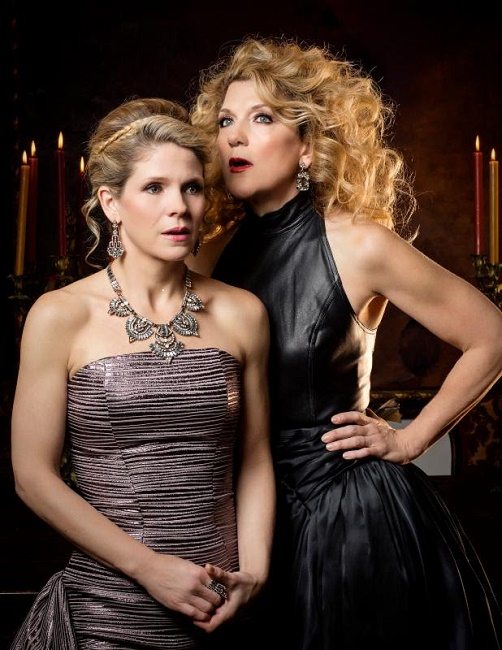
 Last time Victoria Clark and Kelli O’Hara shared the stage they played mother and daughter in Adam Guettel’s gorgeous The Light in the Piazza; more than a decade later they are portraying mortal enemies in City Center’s production of Henry Purcell and Nahum Tate’s Baroque opera Dido & Aeneas. O’Hara stars as Dido, the grief-stricken Queen of Carthage who sees a chance at happiness with Trojan sailor Aeneas (Elliot Madore). Clark plays the devilish Sorceress who has her eye set on destroying Carthage and its Queen, and she decides to do so by disguising herself as Mercury and fooling Aeneas into abandoning his Queen.
Last time Victoria Clark and Kelli O’Hara shared the stage they played mother and daughter in Adam Guettel’s gorgeous The Light in the Piazza; more than a decade later they are portraying mortal enemies in City Center’s production of Henry Purcell and Nahum Tate’s Baroque opera Dido & Aeneas. O’Hara stars as Dido, the grief-stricken Queen of Carthage who sees a chance at happiness with Trojan sailor Aeneas (Elliot Madore). Clark plays the devilish Sorceress who has her eye set on destroying Carthage and its Queen, and she decides to do so by disguising herself as Mercury and fooling Aeneas into abandoning his Queen.
As far as opera plots go, Dido & Aeneas doesn’t even have the most elaborate structure, in fact telling someone what the show is about makes it sound rather “light”. But this simplicity is overshadowed by the elaborate melodies crafted by Purcell, and the soul-piercing lyrics by Tate, who took a tiny piece of Virgil’s Aeneid and transformed it into an artwork for the ages. The City Center production directed and choreographed by Doug Varone, features the singers of MasterVoices who sit on bleachers acting as a Greek chorus of sorts, with some of the singers being highlighted during moments like “The Sailor Song” in Act III.
In fact, that very song, in which a sailor exclaims,
“Time and tide will admit no delaying.
Take a bouzy short leave of your nymphs on the shore,
And silence their mourning
With vows of returning
But never intending to visit them more”
, seems to have inspired Michael John LaChiusa who was commissioned a brand new prologue to go along with the opera. His piece called “The Daughters of Necessity” gives a preview of what’s to come, and features Clark as a goddess who decides who lives and dies by cutting a thread which symbolizes human lives. Dressed in Rosie the Riveter overalls, Clark and her stage companions comment on the capriciousness of fate and wonder who decides on whether who lives or dies. They have no concrete answers, but the infectious melody takes one away from the tragedy that is to follow. If anything, LaChiusa establishes how comedy and drama are but different sides of the very same coin.
The very precise costumes of the Prologue however, set the tone for what is a decisively feminist take on the opera, which highlights Dido’s power over her subjects, and also her influence over her sister Belinda (an exquisite Anna Christy). In this version, Dido meets a tragic end not necessarily because the gods command it, but because she and only she has complete control over her body.
One could even suggest there are contemporary political allegories at play in this production, which sees the Sorceress become a beacon of pure hatred, the origin of which seems occult even to her, but which she has no choice but to see through;
“The Queen of Carthage, whom we hate,
As we do all in prosp'rous state,
Ere sunset, shall most wretched prove,
Depriv'd of fame, of life and love!”
,she sings to her minions, with glee in her eye and a smile as wide as a moon. Clark, whose voice can be both sweet and menacing, has a ball playing a villain who seduces others to follow her along with an endgame as of yet unclear. She tousles her hair, seems to reach climax as she sees Dido suffer (the two never meet “officially”) and eventually vanishes, just like many modern politicians who disappear once they’ve accomplished their messy plans.
Aeneas, in spite of Madore’s tremendous stage presence and voice, is an object Dido and the Sorceress use to measure their own power. To call Dido a sore loser would not be entirely inappropriate, and as played by the magnificent O’Hara, whose instrument has never sounded more clear or haunting (oh lucky are those who get to hear the Tony winner navigate the sea of desolation that is “When I am laid in Earth”), she is also a proud woman so affected by the departure of her lover, that it’s her ego, not necessarily her broken heart that lead her to death. “Remember me, but ah! forget my fate” she demands, so that her sacrifice serve as a cautionary tale for other women who place love, rather than power, on such a high pedestal.